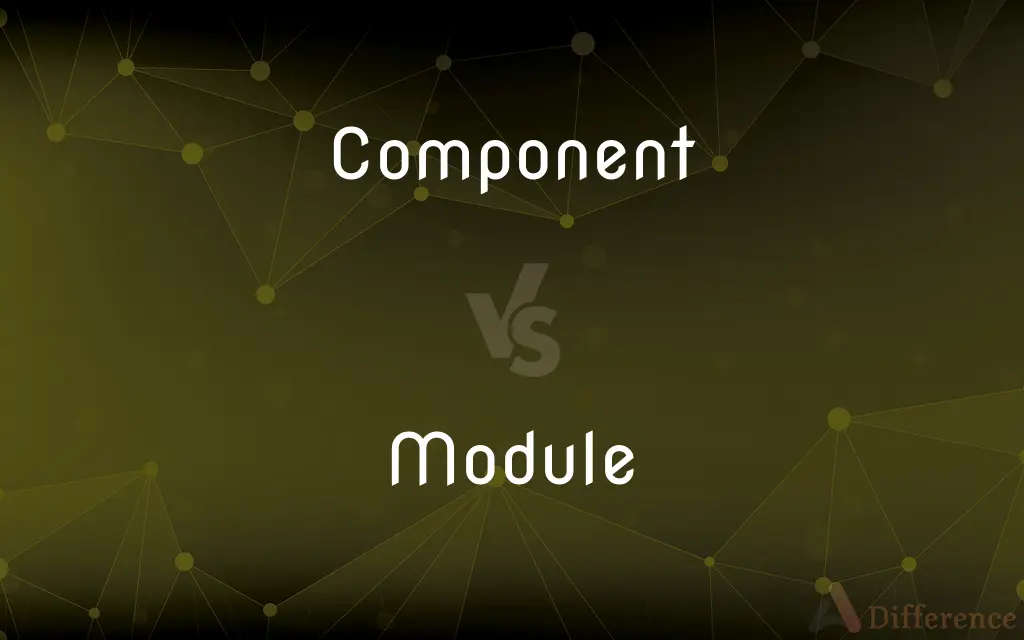Component vs. Module — What's the Difference?
By Maham Liaqat & Urooj Arif — Updated on April 1, 2024
Components are individual parts of a system, focusing on specific functionality, while modules are larger, more independent units that can contain multiple components.

Difference Between Component and Module
Table of Contents
ADVERTISEMENT
Key Differences
Components are the building blocks of a system, designed to perform a single, specific function within that system. They are usually part of a larger module, working together with other components to contribute to the module's overall functionality. Whereas modules are broader in scope, encapsulating a group of interrelated components to provide a larger, more complex functionality within the system.
While components emphasize reusability and encapsulation, focusing on a narrow set of tasks, modules prioritize modularity and maintainability, often encapsulating a domain of functionality. This makes components ideal for tasks that require specific functionality repeated across different parts of a system, and modules ideal for organizing the system into higher-level functions.
Components are typically easier to swap, replace, or update without affecting the rest of the system, thanks to their smaller size and specific functionality. On the other hand, replacing or updating a module might require more extensive changes due to its broader impact on the system.
The design of components usually aims for minimal dependencies to facilitate reuse in different contexts within the system. In contrast, a module might have internal dependencies among its components but presents a unified interface to the rest of the system, simplifying system integration and interaction.
Both components and modules play crucial roles in system design, with components offering focused functionality and ease of replacement, and modules providing structure and encapsulation for a subset of the system's functionality.
ADVERTISEMENT
Comparison Chart
Scope
Narrow, focuses on a specific functionality
Broad, encompasses a set of related functionalities
Granularity
Smaller, more specific
Larger, more complex
Reusability
Designed for reuse across various parts of a system
Can be reused as a whole, but less flexible than components
Dependency
Minimal dependencies, to ease reuse
May contain internal dependencies but presents a unified interface
Role in System Design
Building blocks of a system, contributing to parts of a module
Organizes system into higher-level functionalities, containing multiple components
Compare with Definitions
Component
Typically has a single, well-defined purpose.
A search bar component handles user queries within an application.
Module
Encapsulates a domain of functionality, simplifying system architecture.
An e-commerce module including shopping cart, product listing, and payment processing components.
Component
Designed to work within the context of modules, contributing to broader system functionality.
A user authentication component is part of a larger security module.
Module
Offers modularity and maintainability, organizing system architecture.
Dividing a large application into modules like user interface, data processing, and backend integration.
Component
A distinct, functional unit within a system, designed for a specific task.
A button in a software application's UI is a component.
Module
A higher-level grouping of components that provides a larger, more complex functionality.
A user management module in a software application.
Component
Encourages code reusability and encapsulation.
A navigation menu component reused across multiple web pages.
Module
Contains multiple components, each handling part of the module's functionality.
A reporting module comprising data collection, analysis, and visualization components.
Component
Easily replaceable and updateable due to its specific functionality.
Swapping out a login form component for an updated version.
Module
Presents a unified interface to the rest of the system, despite internal complexities.
An API module providing a set of interfaces for external systems to interact with.
Component
A part or element of a larger whole, especially a part of a machine or vehicle
Hydrogen is a component of all organic compounds
An assembly plant for imported components
Module
A standardized, often interchangeable component of a system or construction that is designed for easy assembly or flexible use
A sofa consisting of two end modules.
Component
Constituting part of a larger whole; constituent
The component elements of the armed forces
Module
(Architecture) A length used as a unit of measurement or as a standard for determining the proportions of a building.
Component
A constituent element, as of a system.
Module
(Electronics) A self-contained assembly of electronic components and circuitry, such as a stage in a computer, that is installed as a unit.
Component
A part of a mechanical or electrical complex.
Module
(Computers) A portion of a program that carries out a specific function and may be used alone or combined with other modules of the same program.
Component
(Mathematics) One of a set of two or more vectors having a sum equal to a given vector.
Module
A self-contained unit of a spacecraft that performs a specific task or class of tasks in support of the major function of the craft.
Component
Being or functioning as a constituent or an ingredient.
Module
A unit of education or instruction with a relatively low student-to-teacher ratio, in which a single topic or a small section of a broad topic is studied for a given period of time.
Component
A smaller, self-contained part of a larger entity. Often refers to a manufactured object that is part of a larger device.
A CPU is a component of a computer.
Module
(Mathematics) An algebraic system that resembles a vector space, except that the set of scalars forms a ring and not necessarily a field.
Component
Making up a larger whole; as a component word.
Module
(Biology) A unit of modular growth, such as a coral polyp.
Component
Made up of smaller complete units in combination; as a component stereo.
Module
(Archaic) A standard or unit of measurement.
Component
Serving, or helping, to form; composing; constituting; constituent.
The component parts of natural bodies.
Module
A self-contained component of a system, often interchangeable, which has a well-defined interface to the other components.
Component
A constituent part; an ingredient.
Module
(architecture) A standard unit of measure used for determining the proportions of a building.
Component
An abstract part of something;
Jealousy was a component of his character
Two constituents of a musical composition are melody and harmony
The grammatical elements of a sentence
A key factor in her success
Humor: an effective ingredient of a speech
Module
(programming) A section of a program; a subroutine or group of subroutines.
Component
Something determined in relation to something that includes it;
He wanted to feel a part of something bigger than himself
I read a portion of the manuscript
The smaller component is hard to reach
Module
A unit of education covering a single topic.
Which modules are you studying next year?
Component
An artifact that is one of the individual parts of which a composite entity is made up; especially a part that can be separated from or attached to a system;
Spare components for cars
A component or constituent element of a system
Module
A pre-prepared adventure scenario with related materials for a role-playing game.
Module
An abelian group equipped with the operation of multiplication by an element of a ring (or another of certain algebraic objects), representing a generalisation of the concept of vector space with scalar multiplication.
Module
A fractal element.
Module
(music) A file containing a music sequence that can be played in a tracker (called also mod or music module).
Module
(hydraulics) A contrivance for regulating the supply of water from an irrigation channel.
Module
(astronautics) An independent self-contained unit of a spacecraft.
Module
A model or measure.
Module
The size of some one part, as the diameter of semi-diameter of the base of a shaft, taken as a unit of measure by which the proportions of the other parts of the composition are regulated. Generally, for columns, the semi-diameter is taken, and divided into a certain number of parts, called minutes (see Minute), though often the diameter is taken, and any dimension is said to be so many modules and minutes in height, breadth, or projection.
Module
To model; also, to modulate.
Module
One of the inherent cognitive or perceptual powers of the mind
Module
Detachable compartment of a spacecraft
Module
Computer circuit consisting of an assembly of electronic components (as of computer hardware)
Module
A self-contained component (unit or item) that is used in combination with other components
Common Curiosities
What is a component in system design?
A component is a distinct, functional unit within a system, designed to perform a specific task, emphasizing reusability and encapsulation.
Can a module exist without components?
Typically, a module is composed of multiple components; it organizes and groups these components into a larger, cohesive functionality.
How does component reusability benefit system design?
Component reusability allows for the efficient reuse of code across different parts of a system, reducing redundancy and facilitating easier updates and maintenance.
Can components be shared across modules?
Yes, components can be designed to be reusable across different modules, enhancing system flexibility and reducing development effort.
What defines a module in software architecture?
A module in software architecture is a larger, more complex grouping of components that encapsulates a domain of functionality, offering modularity and maintainability.
Why are modules important in software development?
Modules are important because they help organize system architecture into manageable, coherent parts, simplifying development, maintenance, and scalability.
What is the advantage of modular system design?
Modular design enhances system maintainability, scalability, and understandability by organizing complex functionalities into manageable parts.
How do developers decide between creating a new component or a new module?
The decision is based on the scope of functionality: specific, isolated functions are suited to components, while broader, cohesive functionalities suggest the need for a new module.
How do components and modules interact within a system?
Components perform specific tasks within a module, and modules organize these components to provide broader system functionality, interacting through defined interfaces.
Are modules interchangeable in a system?
Modules can be designed to be interchangeable if they provide similar functionalities through a unified interface, though this depends on the system's architecture.
What role do dependencies play in components and modules?
Components aim for minimal dependencies for ease of reuse, while modules manage internal dependencies among components but present a simplified interface externally.
Can a component be part of multiple modules?
Yes, a well-designed component can be part of multiple modules, provided it serves a purpose in each without compromising functionality.
How do modules contribute to system integration?
Modules, with their unified interfaces and encapsulated functionalities, simplify system integration by providing clear, manageable points of interaction for external systems or other modules.
What is the relationship between components and system scalability?
Components, through their reusability and encapsulation, directly contribute to system scalability by simplifying the addition of new functionalities and updates.
How does updating a component affect a module?
Updating a component can improve or alter the functionality of the module it belongs to, ideally without affecting the module's overall operation if designed with encapsulation in mind.
Share Your Discovery

Previous Comparison
Vista vs. Panorama
Next Comparison
Emma vs. EmaAuthor Spotlight
Written by
Maham LiaqatCo-written by
Urooj ArifUrooj is a skilled content writer at Ask Difference, known for her exceptional ability to simplify complex topics into engaging and informative content. With a passion for research and a flair for clear, concise writing, she consistently delivers articles that resonate with our diverse audience.














































